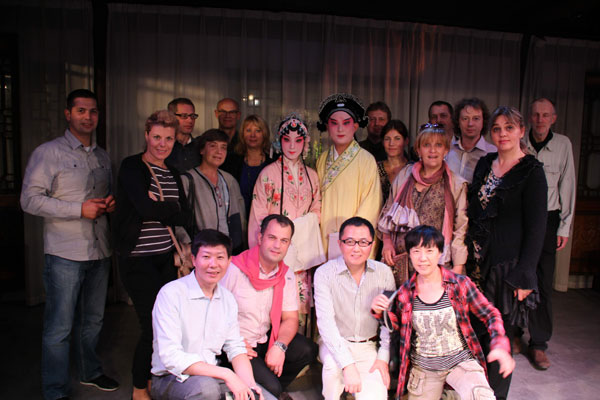Europeans explore China's musical dream
Updated: 2012-11-17 07:56
By Mu Qian (China Daily)
|
|||||||||||
|
 Directors from Central and Eastern Europe pose with local opera performers when they visit Suzhou, Jiangsu province, during their two-week China tour. Provided to China Daily |
From contemporary Chinese music to Kunqu Opera, from jazz to traditional minority folks songs, a two-week China tour led directors of 16 festivals from Central and Eastern Europe to experience the diverse music cultures of China.
"During this trip, I have not only seen some very interesting performances, but also got to know many Chinese artists who are proud of their activities and at the same time are very open to European art and culture," says Anna Zsofia Vitezy, managing director of the Budapest Spring Festival. "I love this country and I hope I'll be able to come again to see more."
Invited by the Chinese Ministry of Culture, Vitezy and the other festival directors from Central and European countries started their journey in Shanghai, where they attended the China Shanghai International Arts Festival and its Performing Arts Fair.
They traveled on to Suzhou in Jiangsu province, where they experienced traditional Chinese music such as Kunqu Opera and Pingtan, a kind of local narrative musical performance. They also went to Guizhou province to meet musicians of the Miao and Dong ethnic groups.
In Beijing, they attended the Beijing Music Festival, held a workshop for music and arts festival organizers for three days, and met with major Chinese performing arts troupes.
The delegates represent some of the most established festivals in Central and Eastern European countries, such as Varna Summer International Music Festival of Bulgaria, Warsaw Autumn International Festival for Contemporary Music of Poland, and Festival Ljubljana of Slovenia.
One of their missions on this China tour is to select programs for their festivals, and many have achieved their goals. Vitezy has signed a contract with China Shanghai International Arts Festival to bring Shanghai Puppet Theater to perform at 2013's Budapest Spring Festival, and she is planning to feature China as the festival's "country in focus" in 2014 and invite many artists from China to perform in Budapest.
Many other festival directors are interested in composer Tan Dun's new work The Secret Songs of Women - Symphony for 12 Micro Films, Harp and Orchestra, which was showcased at the China Shanghai International Arts Festival Performing Arts Fair. Roman Belor, director of Prague Spring Festival, says he would like to have the work at his festival as soon as possible. However, some of the traditional Chinese performing arts may be more challenging for European festivals.
"If we invite traditional artists from China, it has to be very well prepared, because European audiences don't know that much about the Chinese traditions, and we have to introduce many things to them," Vitezy says.
Vitezy enjoyed the Kunqu Opera performance that she saw in Suzhou, especially the atmosphere of traditional China in the environment of a Chinese garden and pavilion. She says if she presents Kunqu Opera in Budapest, she will find a similar place so as to get the audience into the context of the performance.
Besides selecting programs, delegates of the group had another, bigger, mission - to increase the cultural exchanges between Central and Eastern European countries and China.
China had good cultural exchange relationships with Central and Eastern European countries in the 1950s and 1960s. Shanghai Spring, which was founded in 1960 as one of the first music festivals in China, was modeled after the Prague Spring Festival.
But such exchanges became fewer after 1989 when drastic political changes took place in many countries in that region.
"The China tour of Central and European festival directors is a very good beginning for us to expand the current cultural exchange channel between China and Central and Eastern European countries," says Yang Song, director of Division of the Eastern European and Central Asian Affairs, Ministry of Culture's Bureau for External Cultural Relations.
In May 2013, China's Ministry of Culture will invite 16 cultural ministers from Central and Eastern European countries to attend a China-Central and Eastern Europe Cultural Cooperation Forum in China.
Contact the writer at muqian@chinadaily.com.cn
Today's Top News
President Xi confident in recovery from quake
H7N9 update: 104 cases, 21 deaths
Telecom workers restore links
Coal mine blast kills 18 in Jilin
Intl scholarship puts China on the map
More bird flu patients discharged
Gold loses sheen, but still a safe bet
US 'turns blind eye to human rights'
Hot Topics
Lunar probe , China growth forecasts, Emission rules get tougher, China seen through 'colored lens', International board,
Editor's Picks

|

|

|

|

|

|





